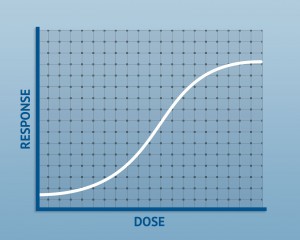 The term “low-dose effects” has been used to refer to effects claimed by some investigators to occur at doses below those tested in standardized toxicology studies and therefore, below levels at which no effects are observed.
The term “low-dose effects” has been used to refer to effects claimed by some investigators to occur at doses below those tested in standardized toxicology studies and therefore, below levels at which no effects are observed.
Studies that claim to show low-dose effects typically have notable shortcomings and possess questionable relevance to regulatory science, including use of non-validated test methods, irrelevant routes of exposure and insufficient replication, and excluding normal physiological detoxification processes. Therefore, the scientific certainty and relevance to human health of such low-dose effects is highly questionable. When integrating results from a full range of toxicity studies, the weight of evidence afforded to such low-dose studies is generally low.
Moreover, the regulatory testing framework to understand the safety of crop protection products is scientifically strong. In cases of reported low-dose effects, a weight of evidence approach ensures data from all relevant toxicity tests and investigative research studies are comprehensively reviewed, given appropriate weight and integrated in a manner that provides a biologically plausible understanding of the potential hazards and risks from exposure.
The weight of available scientific evidence supports maintaining current testing and risk assessment approaches, therefore, changes are not required in relation to low-dose effects.
For more information about Low-Dose Effects, click here.